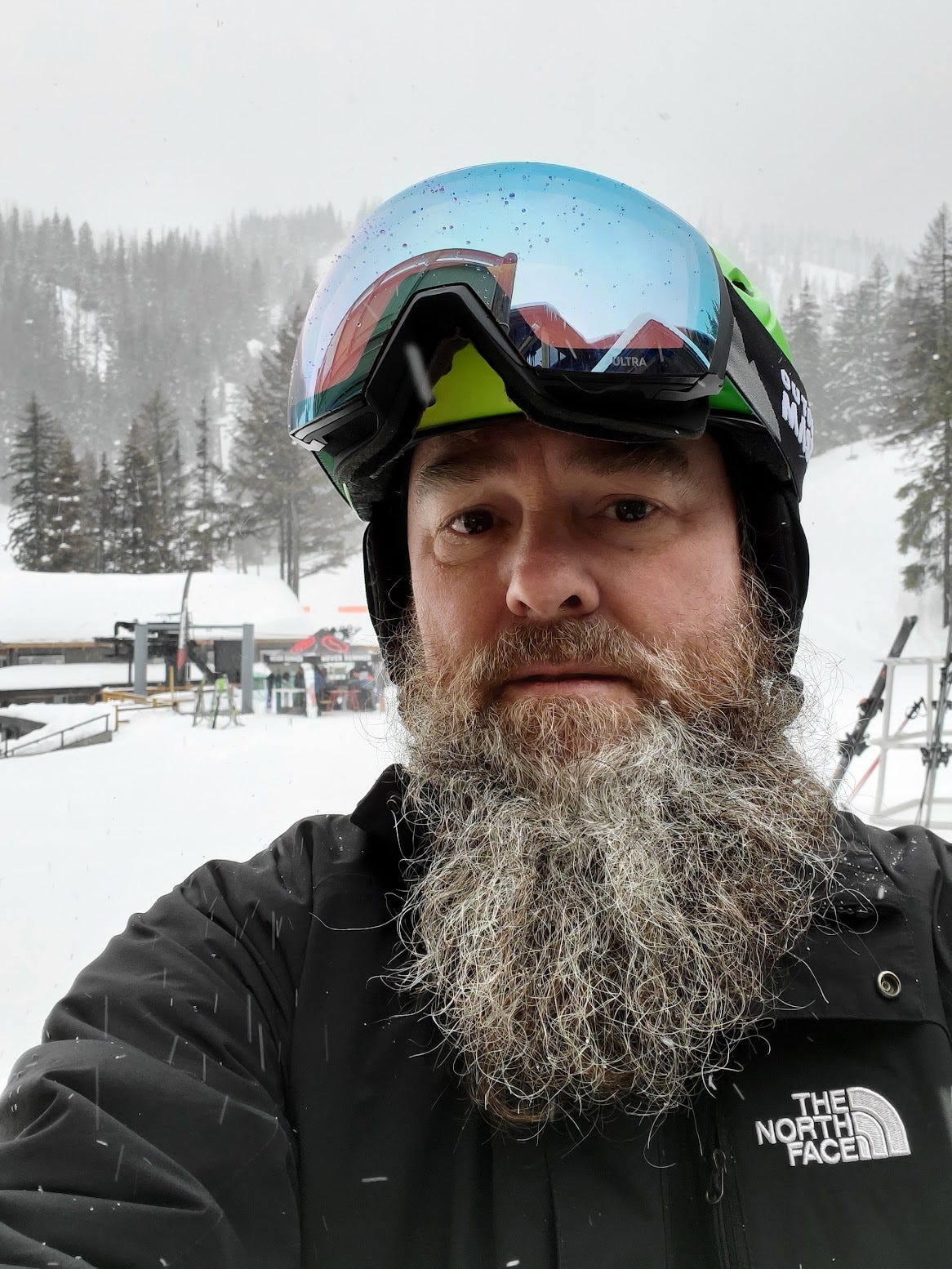I went skiing last week for a few days. It was great to take a break, unplug, and not do too much other than exercise and sleep for a few days. While the snow was fantastic every day, on the first day, there was a bit of a cloud cover - by “a bit”, I mean that for the first 500 or so vertical feet from the top of the main chair, I couldn’t see clearly more than five feet away. Fortunately, after a few runs, I sort of memorized where the initial runs went and was able to get to better visibility with some safety.
But in those first dozen turns, I would have an odd experience. In the fog, I couldn’t tell where the snow ended and the air began. I couldn’t find a fall line, so I just tried to make good turns and listen to my skis. The wind was blowing moderately as well, which added to my white-out confusion. Multiple times, I would stop to get my bearings after a few turns, only to discover that I wasn’t actually stopped. My skis were still moving - sometimes forward, sometimes backward - even though I thought I stopped. I felt like I was in a hanted house. This dizziness / vertigo lasted for hours after I stopped skiing (but thankfully, eventually went away).
Time to Think
I put some thought into choosing where to ski this week. I used to go to Whistler every year, but every year, there were more people, longer lines, and higher prices. I decided to go to a much smaller ski area where prices were low, where I knew the skiing would be good, and maybe most importantly, where there wouldn’t be a lot of people. The exercise and fresh air were great, but I especially enjoyed the meditation and thinking time that the chairlift gave me.
Something I thought about on a few of those lift rides were the times at work where I felt like I was standing still or stagnating, but still growing - and the times where I thought I was growing and moving, but I was actually standing still.
Career Whiteout
I’ve worked on tools/infrastructure/platform teams for most of my career. One thing I have said many times on these teams, is that it’s easy to be really busy, do a lot of solid work, and not have a lot to show for it. Sometimes (often?) teams like ours are only staffed to keep the business running, but even then, balancing keeping the lights on with a few “big rocks” / goals that make a noticeable difference for the organization is possible. In Drive, Dan Pink tells us that humans are motivated by progress. If we don’t have those goals, we may think we’re moving, but we’re actually standing still.
In career growth, there have been times in my career where I didn’t think I was growing, but somehow I was. I remember one time where I felt like I was doing nothing. I had a team member who wasn’t performing, and worse - their attitude was affecting the rest of the team - including me. I worked to help them (and then to help them find their next role at a new company) while simultaneously making sure the damage they were causing was mitigated. This had an effect on the other things I wanted our organization to accomplish, and I felt like everything stopped. In the end though, I learned a lot about leadership and management and feedback during that time. I thought I was standing still, but when I looked at my skis (or reflected on what I learned), I was still moving.
On the other side, it can be easy to get caught up in the day-to-day tasks of our jobs and lose sight of the bigger picture or long-term goals. Without taking the time to regularly assess our progress and direction, we can experience a form of "career whiteout" where the way forward becomes obscured and progress stalls. It’s worth asking ourselves frequently if we’re actually growing and improving.
Reflection
For me, the only way to tell whether I’m standing still or moving is to take the time to reflect. Yes, I’m one of those people who takes (at least) 30 minutes in a quiet room every week to think about how things went, what I learned, and what I want to do differently (and this is exactly why I enjoyed my solo chairlift rides so much). This frequent reflection (or self-retrospective) has been a way for me to examine what I want to do (or not do) and make sure I’m taking intentional steps towards learning and improvement.
This article on self-reflection from HBR leads with the following statement.
Research shows the habit of reflection can separate extraordinary professionals from mediocre ones.
and then leads to this wonderful nugget based on their research (bold is mine).
Their experiences reflected this fundamental truth: As humans, we tend to naively hypothesize about what will happen next based on what has already occurred. As a part of our cognitive nature, we use logic and reason to “describe, explain, predict, and control” in order to project some semblance of power over what goes on in our lives.
When we are mistaken, we are surprised — and mistakes, lapses in judgements, and wrongful assumptions are worth our reflection.
Reflections on Reflection
My big takeaway from this week is that maybe I still don’t take enough time to reflect. It’s been hard recently - with a lot of things going on that I don’t really want to reflect about.
But I will.
-A





